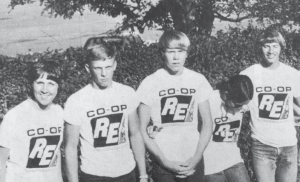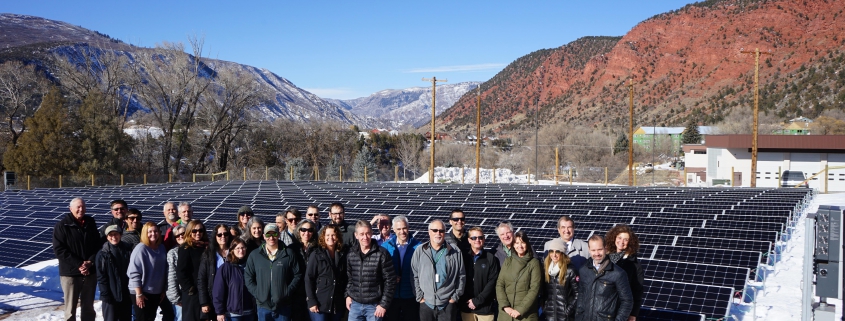By Kylee Coleman
Most Coloradans don’t know life without electricity ready and available when they need it — and at the flip of a switch. Yet in relatively recent history, simple electric lighting and service were not part of life in many rural areas.
“The first 50 years of my life, I lived without electricity,” Paul Huntly said. A board director at Buena Vista-based Sangre de Cristo Electric Association from 1948 to 1977, Huntly once reflected about his experience growing up on an isolated 10,000-acre ranch in rural Colorado. In the February 1977 issue of Colorado Country Life, he said, “What was life like without electricity? [We were] walking through the snow to an outdoor toilet, carrying water from a well, using a coal oil lamp. We took our baths in a washtub in the kitchen, after heating the water on the cookstove.”
Longtime Hugo-based K.C. Electric Association board member Bob Bledsoe also remembers when electricity came to his family’s ranch in eastern Colorado when he was 4 or 5 years old. His dad took him out to watch neighbors bring line in and set the power poles by hand.
“Son, take a good look at what you see right now,” his dad said to him, “because this is really going to change our country.” And it did. Neighbors helped neighbors in their collective effort to bring electricity to Colorado’s rural areas starting in 1936. Communities had solid plans based on the new Rural Electrification Act and people collected signatures and $5 fees to form local electric co-ops.
To work together on shared goals, these new, small, local electric co-ops banded together in 1945 to create what was then called the Colorado State Association of Cooperatives. This month, the Colorado Rural Electric Association celebrates its 75th anniversary as that trade association for Colorado’s 22 electric co-ops and power supplier Tri-State Generation and Transmission Association. Few Colorado rural electric cooperative founders are still living these days, but their original efforts and legacy still power our lives. That’s why the collective cooperative story deserves telling — and retelling.
Statewide support
At its inception, CREA primarily worked on advancing legislative issues and political agendas promoting the rural electrification movement both locally and nationally.
As needs arose, CREA’s focus expanded to indirectly support member co-ops’ consumer-members. Your co-op’s goal is to provide safe, reliable, affordable and environmentally responsible electricity to your community and home. CREA is a tool that co-ops rely on to make that possible. Simply put, CREA has a statewide perspective and a holistic approach to serving co-ops so your community co-op can serve you better.
CREA continues the much needed work on shared co-op issues at the state Capitol as well as working on shared goals in other areas.
Safety and training
A commitment to keep your co-op and its employees safe has always been at the forefront of CREA’s efforts. Since its formation, job training and safety has been a valued service offered by CREA. From providing training programs to organization-wide safety assessments, classes and seminars for all 22 co-ops across the state, the four-person safety team reaches far and wide. The safety team also facilitates mutual aid efforts. When the power goes out in a community or town due to a major weather event, there are 21 other Colorado co-ops that can assist with getting the power back on.
Education
Education is an important spoke of the CREA wheel, and it helps perpetuate industry best practices. Through CREA’s education services, co-op staff and board members can advance their learning and leadership. A range of courses are available for directors, mechanics, accountants, member service managers and human resource specialists, as well as other co-op employees.

Delegates of the 2019 Colorado Youth Camp.

Delegates of the 1973 Colorado Youth Camp.
CREA helps your co-op to support future leaders.
For 25 years, CREA has promoted and organized Colorado co-op high schoolers’ annual Washington D.C. Youth Tour. A great opportunity for the students who are selected to go, the tour allows Colorado teens to meet with nearly 1,900 students from across the country to learn about cooperatives, the legislative process and sightseeing. A weeklong summer Leadership Camp in Steamboat Springs, offered since the 1970s, also gives teens a unique opportunity to learn about the co-op model, develop leadership skills and simply have fun.
Communication
Along with these programs, CREA assists local co-ops with communication services and telling the cooperative story. Colorado Country Life, (which was originally published under the name Colorado Rural Electric News and, later, Rocky Mountain Rural Life) is now in its 67th year of production.
This magazine is the most accessible and efficient way for your co-op to keep you informed. Readers get a little bit of everything: local co-op news and business, community events, local scholarship opportunities and relevant safety issues. Consumer-members also enjoy stories on interesting Colorado people, places, discoveries, recipes, political issues and gardening.
Serving Colorado communities and beyond
Making space for local and international philanthropic efforts has evolved for CREA over the last 75 years. For eight years, Colorado’s electric cooperatives have sponsored a team in the Pedal the Plains bike tour across the eastern plains. The team raises money for Energy Outreach Colorado, a nonprofit organization that helps people with electric bills and energy efficiency updates in homes across Colorado.
In 2018 and 2019, CREA partnered with co-ops from Oklahoma to travel to Guatemala where crews of volunteer linemen electrified small, remote villages. Giving power to people who have never had it before is a proud and important moment for both the linemen and the co-ops they represent.
Still going strong
Since day one of modern rural electrification, the co-op industry evolved remarkably fast. New technologies and generation sources are developed nearly every day and electric service is not going away. Neither is the co-op model. As Bledsoe says, “CREA, in its history, made a profound effect on the infrastructure in Colorado and the people who are served by it. CREA should be a community effort to make sure all the co-ops have affordable and reliable electricity.” And that, it is.
Although the statewide trade association has changed over the past 75 years to meet modern cooperative needs, one thing remains the same: CREA continues to fight for co-op issues and encourage a new generation of people to connect with their cooperatives. CREA looks forward to many more years of representing and serving co-ops and consumer-members across the state.
Kylee Coleman is the editorial assistant at Colorado Country Life magazine. She writes about innovations at Colorado’s electric cooperatives and enjoyed sifting through print archives researching CREA’s history.








